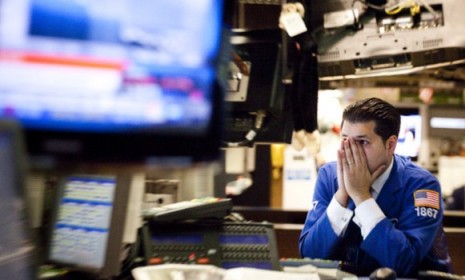Are we at the beginning of a 25-year recession?
The world economy faced a similar slump in the 19th Century. And it wasn't pretty

A free daily email with the biggest news stories of the day – and the best features from TheWeek.com
You are now subscribed
Your newsletter sign-up was successful
The current economic slump won't end any time soon, says Matthew Lynn in MarketWatch. The current crisis eerily resembles one that brought the financial world to its knees in the 1870s. A new industrial power — back then it was Germany, now it's China — had rocketed to the forefront, "blowing apart old industries." Financial markets had been deregulated. Cheap money was everywhere. The "almighty crash" that followed triggered what came to be known as the Long Depression, "a period of volatility, unemployment, and slumps that lasted an epic 23 years." If the aftermath of the crash of 2008 turns out like that, Lynn says, we're stuck like this until 2031. Could we really be in for such a long, painful ride?
Unfortunately, it really might take years to rebound: "Historical parallels are never precise," says Doug Mataconis at Outside the Beltway, as Lynn concedes. But the similarities between the Long Depression and our Great Recession are "rather sobering." At the very least we should acknowledge there might be "a prolonged period of economic upheaval ahead that may be far beyond the ability of any government or Central Bank to control." Food for thought, "if you're in the mood to panic a little."
The Week
Escape your echo chamber. Get the facts behind the news, plus analysis from multiple perspectives.

Sign up for The Week's Free Newsletters
From our morning news briefing to a weekly Good News Newsletter, get the best of The Week delivered directly to your inbox.
From our morning news briefing to a weekly Good News Newsletter, get the best of The Week delivered directly to your inbox.
Relax, not all our nightmares will come true: The doomsayers have plenty of reasons to worry, says Rick Newman in U.S. News. Europe's financial meltdown could burn the U.S.; war with Iran could disrupt oil supplies; Congress' fumbling could get the government's credit rating knocked down another notch. But "overwrought fears tend to produce relief rallies if the worst doesn't actually happen," so 2012 could turn out to be a good year for everyone from homebuyers to "stingy shoppers."
With any luck, gridlock will save us: A lot of people are wringing their hands because Washington isn't doing enough to rescue the economy, says syndicated columnist Thomas Sowell in the St. Augustine, Fla., Record. But if you compare instances when the government butted in during previous slumps (the Great Depression) to cases where it let the free market sort things out (the 1987 stock crash), "doing nothing has by far the better track record." Maybe gridlock helps things turn around more quickly than the pessimists think.
A free daily email with the biggest news stories of the day – and the best features from TheWeek.com